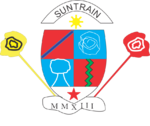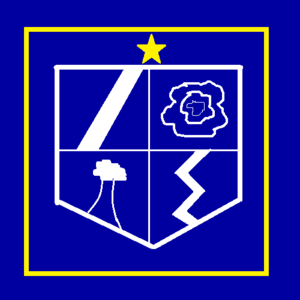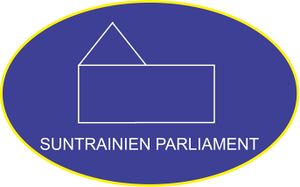Politics and government of Suntrain
| Part of a series on |
| Politics and government of the Republic of Suntrain |
|---|
 |
The Government of Suntrain is a unitary parliamentary democratic secular Republic. The Republic is governed by its constitution and the Government is based on separation of power and checks and balances.
The Government consists of three branches of government: the legislature, the executive and the judiciary. The Parliament is the legislative branch and consists of the House of Representatives and the Senate. The executive power is vested in the President, who is no more than a ceremonial figurehead, and the Government of Suntrain, which consists of the Prime Minister and the other Ministers. The judicial branch is independent of the other two, and its power is mainly vested in the Supreme Court, although there are other inferior courts.
As the Republic is a unitary one, the central or national government retains most power. Only one state has its own legislature, the STSO, while the others only have its own Governor, responsible for the administration of the respective state. There is also a municipality for every city, which is responsible for simple services such as rubbish collection. They are headed by a mayor.
Legislative branch

The Parliament is the legislative branch and is mainly responsible for creating laws. Established by Chapter I of the Constitution, the Parliament is bicameral and consists of the House of Representatives and the Senate. The Senate is the so-called upper house, but in reality has much less power than the House. Both Senators and Representatives are democratically elected, Representatives to two-year terms and Senators to four-year terms, with a staggered half-election every two years.
Article 13 of the Constitution outlines that the Parliament has the power to legislate in respect to:
- trade, commerce, and business between other countries and the states,
- export, import, agriculture and fisheries,
- organisations, corporations and businesses,
- the economy, State spending and the Budget
- the building of public services such as roads, buildings, ports and places of interest,
- transportation services, and management of these services,
- employment, work and civil and humanitarian services such as pensions and conservation of people’s rights,
- freedom of movement, citizenship, foreign travel, passports, immigration, emigration, civil air flight, refugees, and naturalisation,
- postal, communicational, telecommunication and other such services,
- defence and management of the Army, Navy, Air Force, STSO and other such organisations for the protection of the State, its people and foreign relations and treaties between other nations,
- education, preservation of culture, cultural services and linguistic services,
- management of the environment, and mining, and other such services,
- governance of internal affairs, such as internal protection and law enforcement and the management of a police force,
- the management of social services such electricity, gas, water, and hospitals and other medical services,
- the management, establishment and construction of social places such as theatres, cinemas and shopping centres,
- the admission and demission of states, with respect to Chapter V of this Constitution,
- standardisation of currency, money and weights and measures,
- family law for subjects such as marriage and divorce,
- and taxation and other such related matters.
The Parliament also reserves to impeach the President for "bribery, corruption, and other high crimes which damage the reputation of the Republic of Suntrain and the office of the President of the Republic of Suntrain." It does this by first passing an Impeachment Notice with a simple majority through the House of Representatives. The Senate then tries the President, with the Chief Justice presiding. If the Senate passes the same Impeachment Notice with a two-thirds majority, the President loses the office of the President, and the Vice President immediately becomes the President.
House of Representatives
The House of Representatives is responsible for electing the President as well as initiating and introducing most bills into Parliament. The House of Representatives currently consists of seven Representatives. The House is elected using a method of Mixed-Member Proportional Representation, with each eligible voter casting two votes. One of these is used to determine approximately how many seats a party will have and the other is used to elect the local Representative in each of the seven electorates. The number of seats a party is entitled to is first filled by the won electorate seats, and then by members on the party list. The relationship between the Government and the Parliament is based on the Westminster model.
Since the House is the direct connection between the Government and the legislature, it is very important in Suntrainien politics. The House elects the President who then appoints the party or coalition with the most seats in the House as the Government. The leader of the party or coalition is then appointed as the Prime Minister, and other Representatives are appointed upon the advice of the Prime Minister as Ministers. They then form the Cabinet, which consists of the Prime Minister and the Minsters. This is the executive branch and is responsible for the administration of laws and the setting of the government policy. Since the same people control both the legislative and the executive branches, the Government initiates most bills according to their policy determined in Cabinet meetings. As Ministers are also members of Parliament, they are subject to questioning and checking by the opposition, in order to make sure the Government is functioning farily. The Government is responsive to the House and its power derives from it since Ministers are also Representatives. The Government is required to resign if a vote of no confidence is passed through the House or if a supply bill does not manage to pass the Parliament.

Senate
The Senate is the upper house of the Suntrainien Parliament. Being mostly powerless, the Senate consists of two Senators from each state (currently six) and is elected using a method of Single Transferable Vote. The Senate has staggered elections, meaning that at any general election, half of the Senate is up for election, while the other half's term lasts until the next general election. Senators serve four-year terms and are elected to represent states.
The only key powers the Senate possess is to defeat supply bills, where the Government then has to resign, and to defeat other bills, which is even rarer.
Executive branch
Executive power is vested in the Government and the President. The executive branch is outlined in Chapter III of the Constitution. The President retains little to no power in the proceedings of the Government and is mainly a ceremonial figurehead. The Government consists of the Prime Minister and other Ministers. The Government exercises its power through Departments and makes decisions through the Cabinet.
The executive branch is responsible to the House of Representatives, and can be forced to resign if a supply bill is defeated or if the Government loses confidence in the House. New governments are typically made following every general election, which occurs every two years.
President
The President of the Republic of Suntrain is one of the two bodies vested with executive power. He represents national unity, allegiance, independence and sovereignty and is the head of state of the Republic. The President has several reserve powers such as opening and dissolving Parliament and declaring a state of emergency. The President is also the commander-in-chief of the Suntrainien Army, Navy and Air Force. The President represents the Republic home and abroad, but is a figurehead in Suntrainien politics.
The President serves two-year terms, in cohesion with the general elections. The President is elected by the House of Representatives with a two-thirds vote. If the House cannot agree to a two-thirds vote, the Senate then gets the job of picking the President with a simple majority vote. If neither House cannot elect a President, the Speaker of the House becomes Acting President until either House chooses one with a simple majority. If after three sittings of either House, neither elects the President, the Acting President calls a joint session of Parliament to elect him. If after that there is no result, the Acting President dissolves all seats in Parliament and calls another general election.
The President's main power is to sign Bills into Law, or alternatively refuse. Article 111 of the Constitution states that "Once a Bill has passed both Houses, the Bill shall be presented to the President and he shall have the power within two weeks to sign the Bill into Law or to veto the Bill. If the President vetoes the Bill, he shall return it to the House where it originated from and shall refuse to sign it." The President's veto may be overridden with a two-thirds vote in both Houses of Parliament. No Bill can become a Law without the President's signature and is a check on the working of the Government and Parliament.
Although the President also appoints the Government and the Prime Minister, he has little to no choice who to appoint. The President is also not a member of the Cabinet and cannot set policy and implement it. The President does, however, oversee the successful administration of the country and the work the Prime Minister and the Government is doing. The President also appoints diplomats, issues writs for elections, appoints Justices to the Supreme Court and is able to make decisions through Presidential Decree.
Government
The Government of Suntrain comprises of the Prime Minister, the Deputy Prime Minister and other Ministers. The Government is one of the two bodies with vested executive power, the other being the President. The Government is formed following a general election, where the President appoints a party or coalition which is able to sustain confidence of the House of Representatives. The Government is the administrating authority and is responsive to Parliament. The Government is headed by the Prime Minister, who is the Head of Government.
Prime Minister
The Prime Minister is the head of government and is the leader of the party or coalition with most seats in the House of Representatives. The Prime Minister is appointed alongside the Government by the President following a general election. The Prime Minister is responsible to the House. The PM heads the Government and the Cabinet and advises the President on whom to appoint as Ministers.
The PM has no term limits and can govern as long as he retains the confidence of the House, although general elections are conducted every two years. The PM sets the policy for the Government and has a lot of influence over what the Government does. The Prime Minister is accountable for all Government policy and actions. The Prime Minister can be removed from office only if the House passes a vote of no confidence, where the Prime Minister and the Government is required to resign.
The current Prime Minister is of the Socialist Party of Suntrain.
Political parties
| Party name | Logo | Foundation | Leader | Position | Colours | Ideology | Seats | |
|---|---|---|---|---|---|---|---|---|
| Senate | House of Representatives | |||||||
| Socialist Party of Suntrain | 
|
31 October 2013 | Left wing | Red | Socialism |
5 / 8
|
5 / 7
| |
| Mathew United Party | 20 October 2014 | Sam Mathew | Left wing | Light blue | Workers' rights Socialism Progressivism |
2 / 8
|
2 / 7
| |
The Socialist Party of Suntrain and the Mathew United Party are the only parties are the only registered ones in the country and the only ones with parliamentary representation. They both share similar ideologies. The leader of the SPS is the President,, while the leader of the MUP is Sam Mathew. The MUP split from the SPS after Mathew and Sean Lu decided to create their own party.